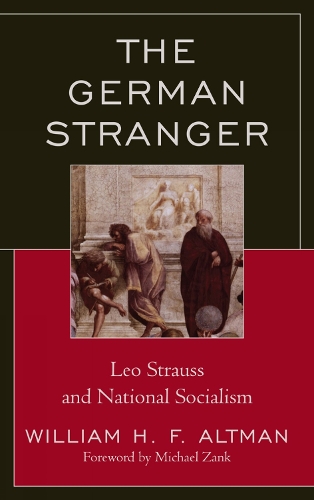
The German Stranger: Leo Strauss and National Socialism
(Paperback)
Publishing Details
The German Stranger: Leo Strauss and National Socialism
By (Author) William H. F. Altman
Foreword by Michael Zank
Bloomsbury Publishing PLC
Lexington Books
7th June 2012
United States
Classifications
Professional and Scholarly
Non Fiction
Social welfare, social policy and social services
181.06
Physical Properties
Paperback
618
Width 152mm, Height 227mm, Spine 36mm
907g
Description
Leo Strauss's connection with Martin Heidegger and Carl Schmitt suggests a troubling proximity to National Socialism but a serious critique of Strauss must begin with F. H. Jacobi. While writing his dissertation on this apparently Christian opponent of the Enlightenment, Strauss discovered the tactical principles that would characterize his lifework: writing between the lines, a faith-based critique of rationalism, the deliberate secularization of religious language for irreligious purposes, and an "all or nothing" antagonism to middling solutions. Especially the latter is distinctive of his Zionist writings in the 1920s where Strauss engaged in an ongoing polemic against Cultural Zionism, attacking it first from an orthodox, and then from an atheist's perspective. In his last Zionist article (1929), Strauss mentions "the Machiavellian Zionism of a Nordau that would not fear to use the traditional hope for a Messiah as dynamite." By the time of his "change of orientation," National Socialism was being led by a nihilistic "Messiah" while Strauss had already radicalized Schmitt's "political theology" and Heidegger's deconstruction of the ontological Tradition. Central to Strauss's advance beyond the smartest Nazis is his "Second Cave" in which he claimed modern thought is imprisoned: only by escaping Revelation can we recover "natural ignorance." By using pseudo-Platonic imagery to illustrate what anti-Semites called "Jewification," Strauss attempted to annihilate the common ground, celebrated by Hermann Cohen, between Judaism and Platonism. Unlike those who attacked Plato for devaluing nature at the expense of the transcendent Idea, the migr Strauss effectively employed a new "Plato" who was no more a Platonist than Nietzsche or Heidegger had been. Central to Strauss's "Platonic political philosophy" is the mysterious protagonist of Plato's Laws whom Strauss accurately recognized as the kind of Socrates whose fear of death would have caused him to flee the hemlock. Any reader who recognizes the unbridgeable gap between the real Socrates and Platos Athenian Stranger will understand why the German Stranger is the principal theoretician of an atheistic re-enactment of religion, of which genus National Socialism is an ultra-modern species.
Reviews
Philosophically trained and philologically inclined, Altman marshals stupendous erudition and dazzling wit in the service of what is both a necessary and a preliminary task in the pursuit of a recovery of the Platonic and biblical foundations of western humanity. Humanity is the cause for the sake of which this book was written. -- From the foreword by Michael Zank
No other critic of Leo Strauss has provided such an erudite, meticulous, imaginative, and eloquent study of his writings. Friend or foe, anyone who wants to participate intelligently in the "Strauss Wars" will need to scrutinize and confront this extraordinary book. -- Peter Minowitz, author of Straussophobia: Defending Leo Strauss and Straussians against Shadia Drury and other Accusers
Altman's important, richly detailed study of Strauss' life and work is likely to change many views of who he was and what he stood for, above all as concerns his complex relations with such pro-Nazi German intellectuals as Heidegger and Schmitt. -- Tom Rockmore, Duquesne University
The German Stranger is a fascinating read. Altman takes up an extraordinarily difficult subjectLeo Strauss's relationship to German National Socialismand handles it with genuine grace and insight. Unafraid to raise troubling and uncomfortable questions regarding Strauss's exoteric style of writing and its relationship to politics, Altman succeeds in providing an excellent analysis of Strauss's relation to the Western philosophical tradition as an exercise in political analysis. By looking critically at Strauss's early philosophical development as a student of Heidegger and considering his relationship to important Jewish thinkers such as Karl Lwith, Gershom Scholem, Franz Rosenzweig, and others, Altman manages to present a convincing portrait of Strauss as a thinker with deep sympathies for a National Socialist worldview. As paradoxical and shocking as this might sound, Altman manages to show how Strauss's thought was deeply influenced by National Socialist ideas and how he was able to suppress such sympathies when he later arrived in the United States. For anyone interested in deconstructing the portrait of Strauss as the spiritual forefather of the Bush-Cheney political crowd, Altman's book will prove eye opening. After reading this work, I came away with a deep appreciation for Altman's breadth of knowledge and philosophical-political insight into long-standing questions about the contradictions implicit in the Western philosophical tradition. For what Altman's project entails is nothing other than a fundamental rethinking of the Platonic and biblical foundations of Western thought. Anyone interested in the work of Strauss or Heidegger will undoubtedly find real gems of insight in this comprehensive and illuminating work. -- Charles Bambach, professor of philosophy, University of Texas at Dallas
Author Bio
William H. F. Altman teaches Latin and World History at E. C. Glass, a public high school in Lynchburg, Virginia..
